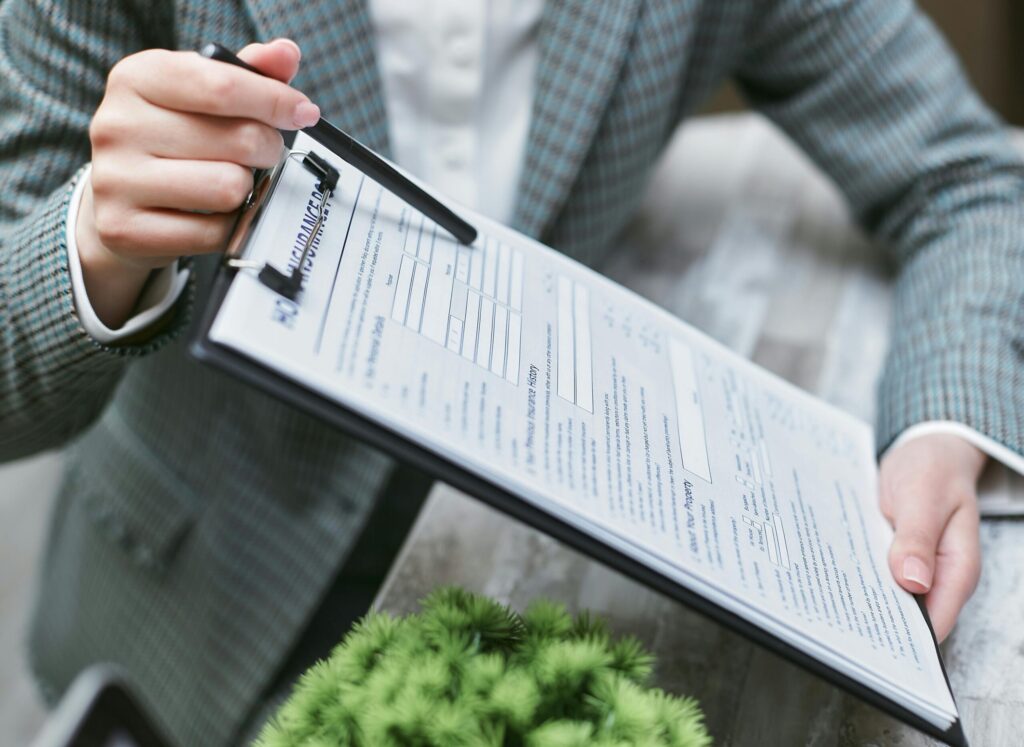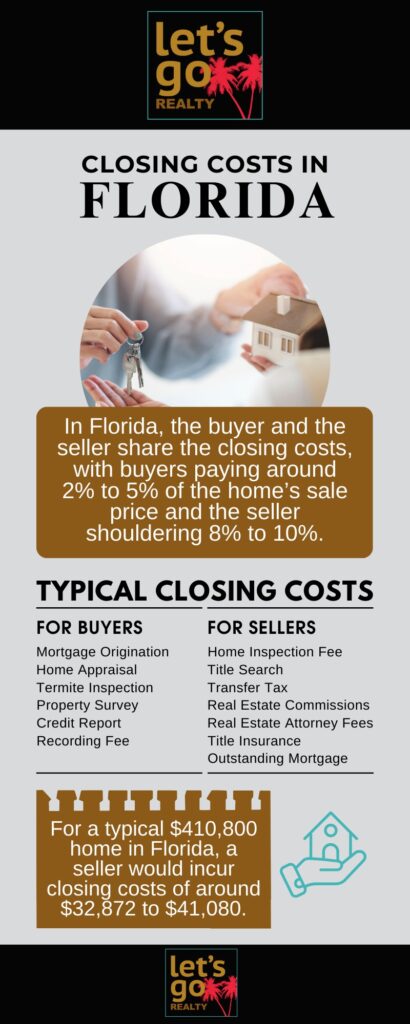In a real estate transaction, the parties involved typically focus on the immediate, upfront expenses. If you’re the buyer, this would be the home’s purchase price and the down payment; while for the seller, it might be repairs and renovations.
But before the deal can be finalized, there are additional expenses that both the buyer and the seller need to cover – the closing costs. These are the fees and charges for the services and taxes associated with the real estate transaction.
Whether you’re the buyer or the seller, here’s everything you need to know about closing costs in Florida, and who pays for them.

Understanding Closing Costs in Florida
Let’s answer two of the most common questions people ask about closing costs in the Sunshine State: “Who pays closing costs in Florida?” and “How much are closing costs in Florida?”
In Florida, the buyer and the seller share the closing costs, with buyers paying around 2% to 5% of the home’s sale price and the seller shouldering 8% to 10%.
To put this in perspective, for a typical $410,800 home in Florida, a buyer may spend between $8,060 and $20,150, while a seller would incur closing costs of around $32,872 to $41,080.
Buyers pay their portion out-of-pocket, while seller closing costs are often deducted directly from the home-sale proceeds. It is important to note that many of these closing costs are open to negotiation.

Buyer's Closing Costs in Florida
The closing costs for buyer in Florida can be determined by reviewing the Loan Estimate and Closing Disclosure, using online closing cost calculators, and consulting with a real estate agent and mortgage lender.
Below, you’ll find the common closing costs for buyers in Florida:
Mortgage Origination
A mortgage origination fee amounting to 0.5% to 1% of the loan amount is charged by the lender for processing the loan application, underwriting, and paperwork.
Home Appraisal
The lender requires a professional home appraisal to verify that the house is worth at least the amount they’re loaning the buyer. This typically costs $650.
Termite Inspection
A termite inspection is often required to ensure the home is pest-free to avoid structural damage in the future. Costs between $75 to $400.
Property Survey
A property survey verifies boundary lines depending on the lot size and square footage. Fee is $275.
Credit Report
Lenders may check the buyer’s credit report to access their financial history and determine the best loan terms for them. Fee ranges between $10 and $100.
Recording Fee
This is usually $10 for the first page and $8.50 for each additional page. This covers the cost of documenting the property ownership.

Seller's Closing Costs in Florida
While both buyers and sellers pay a portion of the closing costs, certain parts of Florida have unique customs when it comes to who pays for what.
For example, although sellers throughout most of the state pay for the owner’s title insurance policy, the buyer typically covers this expense in populous counties like Miami-Dade.
Here’s a breakdown of common sellers’ closing costs in Florida:
Home Inspection Fee
A home inspection can help identify potential issues before the home is listed for sale. This costs between $325 and $425.
Title Search
A title search confirms property ownership and identifies any liens to ensure a smooth property transfer.
Transfer Tax
In Florida, it is mandatory for sellers to pay transfer tax to complete the legal transfer of the property. The fee is $0.70 per $100 of the home price.
Real Estate Commissions
The seller is responsible for paying the listing agent’s commission, which is 2.5% to 3% of the home’s sale price.
Real Estate Attorney Fees
A real estate attorney’s fees ranges from $100 to $500 per hour. A real estate attorney may assist the seller in drafting title deeds, short sales, and negotiations with creditors.
Title Insurance
While a title insurance protects the buyer and lender against any ownership dispute, it is the seller who usually pays for it. In Florida, sellers are obligated to pay for title insurance in 63 out of the 67 counties. Buyers cover this expense only in Broward, Dade, Manatee, and Sarasota.
Outstanding Mortgage Payoff
The seller must settle the remaining mortgage amount at closing. This amount can vary based on the remaining balance.
Strategies for Managing Florida Closing Costs
How to Lower Buyer Closing Costs in Florida
If you are the buyer, there are a few ways you can reduce your closing costs. For one, you can look for alternate service providers who charge lower fees once you receive the loan estimate from your lender.

You can also shop for service providers. If the seller or their agent chooses the title and escrow provider, you can negotiate the purchase agreement. You can also look for other low-priced services.
Another way to lower buyer closing costs is to request the seller to cover some of the costs. The most a seller can provide in terms of concessions is 3% to 6% of the home’s sale price.
And lastly, you can obtain buyer incentives from your real estate agent, such as grants or rebates. Research on special programs that offer forgivable loans to cover your closing costs.
How to Lower Seller Closing Costs in Florida
If you are the seller, reducing your closing costs translates to an increase of your profits. Hiring a discount broker or a low-commission realtor who typically charge from 1% to 2.5% of the sales price can provide significant savings compared to a traditional listing agent who charges 3% of the sales price.
Another way to lower seller closing costs is to research and compare more affordable service providers for legal assistance, home inspection, and escrow management.
And lastly, you can ask the buyer to help you with the closing costs. In a seller’s market, where there are more buyers than the available homes for sale, the buyer may agree to this just to close the deal.
Conclusion
Whether you’re buying or selling, working with knowledgeable local real estate agent is crucial for understanding closing costs in Florida and negotiating on your behalf to make sure you get the most out of the deal.
If you need assistance with your home purchase or sale, please feel free to give me a call today at 305-776-2992 or email me at gregory@letsgoREALTY.COM to schedule an appointment.
Frequently Asked Questions
How much are closing costs for sellers in Florida?
For a typical $410,800 home in Florida, a seller would incur closing costs of around $32,872 to $41,080.
What is the average percentage of closing costs in Florida?
In Florida, buyers pay around 2% to 5% of the home’s sale price, and sellers shoulder 8% to 10%.
Who usually pays for the owner's title insurance in Florida?
In Florida, sellers are obligated to pay for title insurance in 63 out of the 67 counties. Buyers cover this expense only in Broward, Dade, Manatee, and Sarasota.


